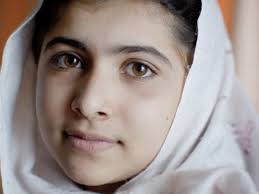
MINGORA / LONDON, Oct 8: Iconic teenage activist Malala Yousafzai on Monday said she wanted to change the face of Pakistan by venturing into politics in future.
The 16-year-old activist has also backed dialogue with the Taliban, despite repeated death threats by the militants. “I will be a politician in my future. I want to change the future of my country and I want to make education compulsory,” Malala told the BBC in an interview.
“If I’m saying that there is no-one who is doing anything for education, if I say there is no electricity, there is no natural gas, the schools are being blasted, and I’m saying no-one is doing this, why don’t I go for it, why don’t I do this?”
Malala said, talking about her ambitions to pursue politics. “The best way to solve problem and to fight against war is through dialogue, and is through peaceful way,” she said.
“But for me the best way to fight against terrorism and extremism is a simple thing – educate the next generation.”
Talking about issues of terrorism and dialogue with the Taliban, Malala said it was not her job, “It’s the government’s job, and not an issue for me,” she said, adding “It’s also the job of America.”
Malala said it was important that the Taliban discussed their demands. “They must do what they want through dialogue,” she told the BBC. “Killing people, torturing people and flogging people – it’s totally against Islam. They are misusing the name of Islam.”
The teenager is also among the favourites to win the Nobel Peace Prize, which will be announced on October 11.
During the interview, Malala said winning the peace prize would be ‘a great opportunity’ but that universal education remained her true goal.
“If I win Nobel Peace Prize, it would be a great opportunity for me, but if I don’t get it, it’s not important because my goal is not to get Nobel Peace Prize, my goal is to get peace and my goal is to see the education of every child,” she explained.
Schoolgirls pray for Malala
In her hometown, school friends hope to see Malala win the Nobel Peace Prize this week – but they dream in secret, under pressure from a society deeply ambivalent about the teenage activist. Peeling off from a group of girls at a high school in Mingora, the main town in Swat, Malala’s longtime friend Safia spoke confidently about her and said she deserves it.
“A bicycle cannot run with only one wheel – society is like a bicycle, with the male education as the first wheel and female education as the second one,” she told AFP.
Safia’s sentiments are shared by many schoolgirls in Mingora, who want their country and their area to be known for something other than the Taliban and bombs.
“Malala is a model, not only for us but for the whole of Pakistan,” said 14-year-old Rehana Noor Bacha.
Education has improved in Swat since the Taliban days. Since 2011, the proportion of girls going to school has risen to nearly 50%, from 34%, while that of boys is close to 90%.
Malala’s rise to stardom in the West, and her frequent appearances in the media, have brewed suspicion in a society that expects women to remain out of sight and is quick to blame foreign powers for its ills. The head of girls’ education in Swat, Dilshad Begum, explained that in Pashtun society “people don’t like to see women in front of cameras”.
Maulana Gul Naseeb, a prominent figure in the JUI-F, was more forthright. “America created Malala in order to promote their own culture of nudity and to defame Pakistan around the world,” he told AFP.
Bizarre theories like this have gained ground on social networking sites, with users declaring themselves shocked to see the West elevate a girl ‘only’ wounded while forgetting Afghan and Pakistani children killed by American bombs.
Safia said even people from Malala’s village had opposed her, but the critics were ‘hypocrites and jealous’.
Safia says she is optimistic and determined, and is doing better after spending three months feeling traumatised by the attack.
This week as the Nobel announcement approaches she will pray for Malala’s chances, but warns it will make little difference if she wins. “It will take at least three generations to make things change here,” she sighed.
